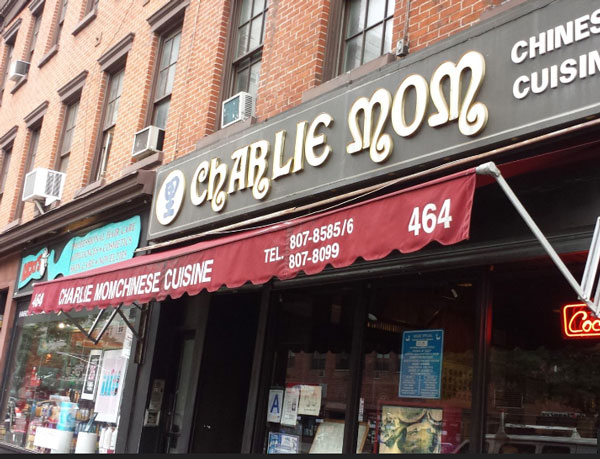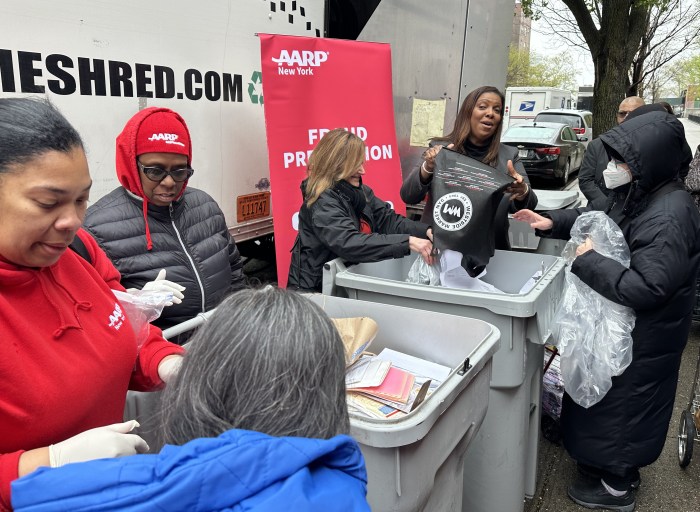
BY LINDAANN LOSCHIAVO | It was a clean, well-lit place, affordable, reliable, popular, an unpretentious spot where you could dally over the dumplings, canoodle in between mouthfuls of spicy Chinese cabbage and, most importantly, hear yourself talk in between the courses of Cantonese specialties.
Unfortunately, Wed., Aug. 26, was the last business day for Charlie Mom Chinese restaurant, at 464 Sixth Ave., near W. 11th St.
Wayne Han, president of Chi Wan Corp., opened his 1,600-square-foot eatery in 1982. Its odd “L”-shaped configuration pleasantly muffled the avenue’s traffic hum and also distanced its customers from its own fast-paced reception desk, where efficient Chinese women patiently answered phones, packed take-out orders and dispatched bike messengers.
A sharp right turn into Charlie Mom’s sunny brick-walled enclosure facing W. 11th St. led patrons to an old-school dining experience that’s become a rarity: no music, no eye-popping monitors, no rushing. Whether it was a cast party for 20, a jolly family celebration or a private tête-à-tête, waiters served with great dispatch and neither the kitchen nor the restroom was an embarrassment.
So why did they close? Was it the competition across the street, from newly opened Shu Han Ju, at 465 Sixth Ave.
“No, Shu serves spicy Szechuan-style, oily food, very different from our chef,” explained David, a former manager. In a hushed tone, he added, “Rent going too, too high!”
But Conrad Bradford, an associate broker at Miron Properties, who has leased commercial space in the Village and Midtown to many restaurateurs, had the advantage of an insider’s view. Three years ago, when he showed Han a vented space in the East Village that was available at a below-market rate, Bradford learned that Charlie Mom’s current lease obligated the owner to pay 65 percent of the real estate tax increase. In a 12-month period, that tax had jumped from $80,000 a year to $110,000.
“It’s a combination of factors here,” observed Bradford. “Mr. Han is now 87 years old; he has a staff of 23, many of whom wish to retire; real estate taxes went sky-high; and whenever a lease ends, many merchants will find the new rent increases insupportable.
“What’s crushing entrepreneurs and small businesses in Manhattan,” he added, “is the burden of a serious rent, along with the double whammy of high, unpredictable taxes. The only safe harbor is to buy a building or settle into a commercial condo.”
Interior decorator Martin Hutner, who moved to Greenwich Village in 1969 and recalls partying with Marlon Brando at Trude Heller’s famed club, at Sixth Ave. and Ninth St., agrees. His suppertime standby, Gene’s Restaurant, at 73 W. 11th St., is next door to Charlie Mom and has been serving “Continental Cuisine of Distinction since 1919” — thanks to a long-ago purchase of their premises.
Marilyn Dorato, the former Greenwich Village Block Associations president — whose in-laws enjoyed running the classic West Village hangout Fedora’s for several decades, and who also owned their stately townhouse at 239 W. Fourth St. — was shocked to hear about Charlie Mom’s demise.
“I’m so sad,” she said. “We ordered from there several times a month and I am going to miss their Peking duck.”
Leslie and David Burgin, members of the W. Ninth St. Block Association, who moved to the Village in 1967 and were die-hard Charlie Mom fans, also registered their dismay.
“For me, they were an institution,” Leslie said. “The staff treated everyone well, the tables were nicely spaced, and it wasn’t so dim that older people cannot read the menu. We patronize many neighborhood places to enable them to stay in business. Then they vanish anyway. What can we do?”
Longtime Village resident and activist Gloria Gilbert, noting that one of Charlie Mom’s pluses was that they never nuked the vegetables, emphasized that the Village is losing the affordable, ethnically diverse eateries that used to be a big attraction.
“If only we could do something to stop one more bank, nail salon or CVS from eating up this neighborhood,” she lamented.
Ironically, lower Sixth Ave. was once darkened by an elevated railway that significantly reduced real estate values — even long after it was demolished, leaving many three-story 19th-century houses intact, including the Charlie Mom’s address.
In 1892, two disgruntled landlords fought back. Maria and Henry Hoops had improved a Sixth Ave. property near St. Joseph’s Church, only to see their investment decline in value, thanks to the steam, smoke, cinders and vibrations from the overhead trains. So they sued the Metropolitan Elevated Railway Company, charging it for lost real estate income, as well as the loss of the peaceful enjoyment of their multistory dwelling, hidden beneath the sunless tracks and unrentable at prime market rates.
Now if only we could get that dirty old El back.

















